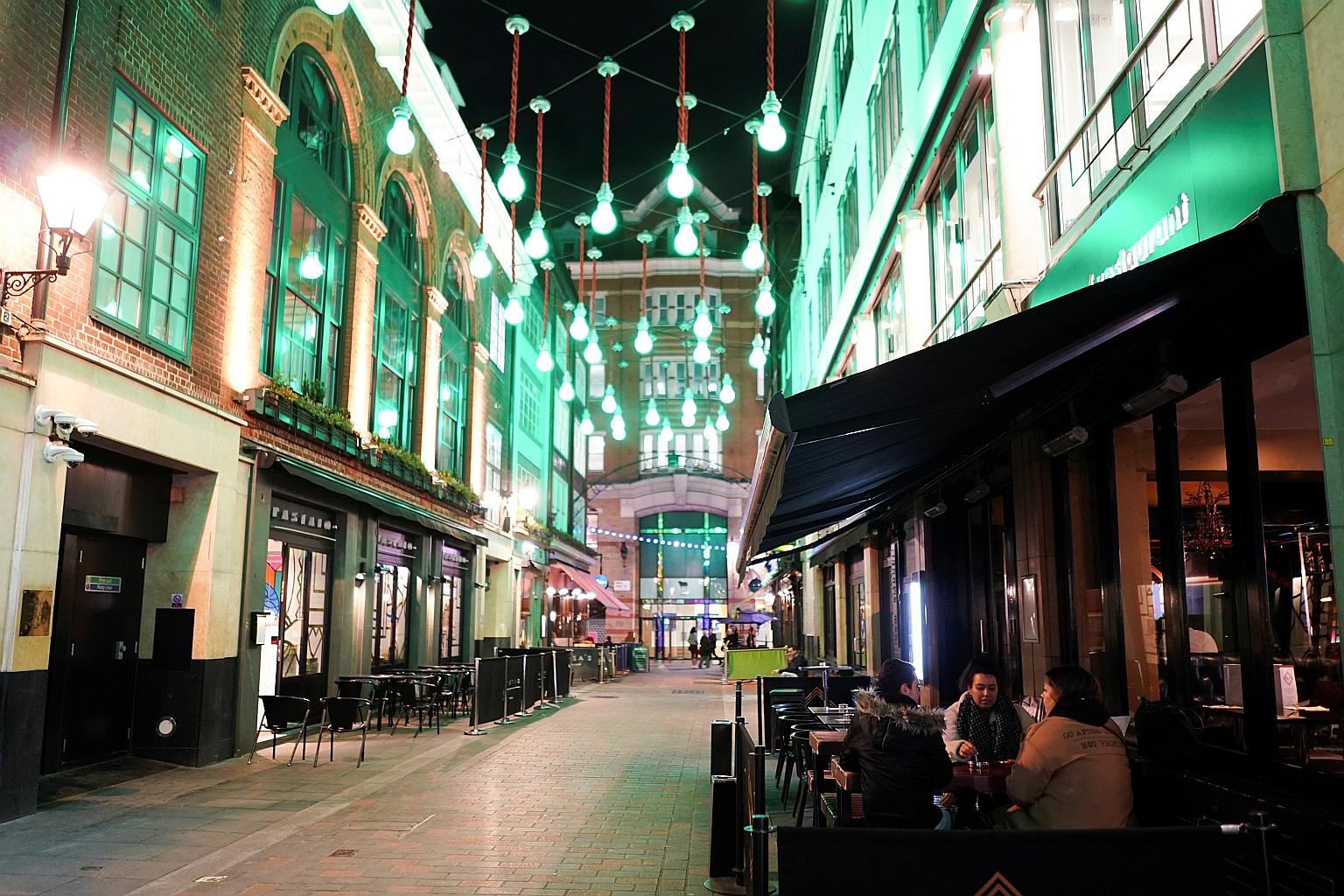Britain makes a U-turn, spooked by projections warning of 260,000 deaths
Sign up now: Get ST's newsletters delivered to your inbox

Restaurants in Soho, London, saw few customers on Tuesday. The British government has reversed course since the start of this week, encouraging people to work from home and avoid public gatherings.
PHOTO: REUTERS
Britain's Chancellor of the Exchequer Rishi Sunak has pledged support for workers facing redundancy as a result of the economic slowdown caused by the Covid-19 pandemic, including the possibility of making direct cash payments to people hit hardest.
Mr Sunak's latest promise comes in addition to an unprecedented £350 billion (S$601 billion) bailout package unveiled by the British government earlier this week to keep businesses and households afloat.
But although the measures - described by Prime Minister Boris Johnson as those of a "wartime government" determined to do "whatever it takes" to support the economy - may help inoculate Britain's economy, they have done little to dampen widespread criticism of the authorities in London for their handling of the outbreak.
As most European countries shut their borders and ordered the closure of shops and restaurants, Britain stood out for going in the opposite direction.
Apart from advising incoming visitors to isolate themselves, no quarantine measures were announced, and the British authorities took no part in recommending the closure of air or sea routes into the country.
The Foreign Office did not ban Britons from travelling overseas either. Advice to avoid "all but necessary travel" was introduced only in response to other countries closing their borders to British citizens.
And at home, the British government refused to close schools, ban public gatherings or enforce lockdowns, measures undertaken by other European nations.
This difference in behaviour was largely due to an early decision by the government to listen to the advice of epidemiologists who claimed that a coronavirus epidemic could not be avoided, and that many of the other countries' measures were unsustainable and ineffective in preventing the spread.
The job of the British government, Mr Johnson's advisers pointed out, should merely be to slow down infection rates to a level which would allow the medical services to cope with the most severe cases to "flatten" the statistical "curve" of infections, as experts liked to describe the strategy.
As a consequence, the British government accepted that up to two-thirds of the population may become infected and subsequently acquire immunity to the virus.
Young people who were infected were told to just stay at home and sweat it out, to save the beds for acute patients.
That, it was hoped, could help Britain avoid the fate of Italy, which started by trying to prevent the infection, then treated everyone who got infected, and ended up being swamped by serious cases which could not be treated because of the lack of hospital beds, leading to high mortality rates.
But the British government has reversed course since the beginning of this week.
People are now encouraged to work from home, and anyone over 70 is firmly told to stay away.
Public gatherings are banned, foreign travel has now largely stopped, universities have suspended courses and schools are about to close too.
One explanation for this U-turn is that the British public reacted badly to the government's approach.
But the real reason is that the government was spooked by projections from its own epidemics modelling team based at Imperial College London, which predicted up to 260,000 additional deaths this year from the virus if drastic containment measures were not introduced.
"The only exit strategy from this (in the) long term is vaccination or some other kind of innovative technology", said Professor Neil Ferguson, the country's foremost epide-miologist. Pending that, aggressive containment is the only option.
Prof Ferguson said on Twitter that he has self-isolated himself after developing a persistent dry cough and a fever.
Sir Patrick Vallance, the British government's chief scientific adviser, told MPs in London that the change in strategy was only "se-mantic". "It is a semantic difference, whether you are calling it suppression, delay or mitigation.
"The aim is exactly the same - how do you keep this thing down and how do you keep it below the level that you want to keep it, and how do you keep it down for long enough to ensure that you have actually managed to achieve that suppression", he said.
Still, the British government is clearly on the defensive, knowing that, should the total mortality figure for the country ultimately prove to be higher than elsewhere in Europe, it will be accused of negligence in handling the pandemic.
The unveiling of a huge financial bailout is intended not merely to deal with an anticipated downturn, but to deflect from an image of inactivity which is beginning to erode Mr Johnson's public standing.
But the hard test is still to come, as the bulge of expected critical cases start arriving in hospitals over the next few weeks.
Projections by the Imperial College London modelling team predict that 4.4 per cent of Britain's 67-million-strong population will be hospitalised, including more than a quarter of those aged over 80.


